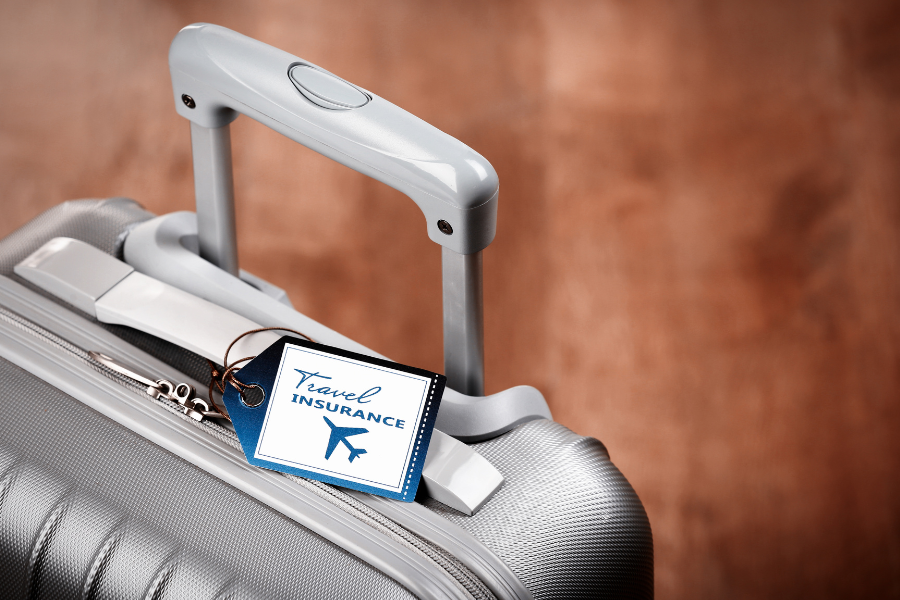Nationwide travel insurance offers a crucial safety net for your adventures. This comprehensive guide explores various plans, from basic to premium, detailing coverage for medical emergencies, baggage issues, and trip disruptions. We’ll also compare it to international options, helping you choose the right policy for your unique needs.
Understanding the nuances of nationwide travel insurance is key to making informed decisions. This guide provides a detailed overview of the coverage, exclusions, and factors influencing selection. From the importance of destination to pre-existing conditions, we’ll break down the considerations in a clear and concise manner, ultimately empowering you to choose the perfect plan.
Overview of Nationwide Travel Insurance
Nationwide travel insurance provides comprehensive protection for travelers, offering various levels of coverage to suit different needs and budgets. This coverage encompasses a wide range of potential issues that can arise during a trip, from unforeseen medical emergencies to lost luggage or trip cancellations. Understanding the specifics of different plans is crucial for making an informed decision.
Nationwide’s travel insurance plans are designed to safeguard travelers against unexpected events, ensuring a smooth and worry-free experience. The plans cover a range of potential circumstances, including medical expenses, trip interruptions, and lost belongings. The policies vary in terms of the scope and extent of coverage, reflecting the different needs of travelers.
Types of Travel Insurance Plans
Nationwide offers various travel insurance plans to cater to different travel styles and budgets. These plans are categorized to provide different levels of protection and features. Choosing the appropriate plan depends on the duration and nature of the trip, the traveler’s health, and the desired level of financial security.
Plan Inclusions and Exclusions
Common inclusions in Nationwide’s travel insurance plans typically include coverage for medical emergencies, trip cancellations or interruptions, lost or delayed baggage, and emergency medical evacuation. However, certain exclusions might apply, such as pre-existing medical conditions, certain activities deemed risky, or travel to specific high-risk areas. It’s essential to carefully review the policy details to understand the precise scope of coverage and any limitations.
Coverage Tiers
Nationwide’s travel insurance plans are offered in various tiers or levels, ranging from basic to premium. Each tier provides a distinct level of coverage, reflecting the varying needs of travelers. Basic plans typically offer fundamental protection, while premium plans often include additional benefits, such as higher coverage limits and broader exclusions.
Plan Comparison Table
| Plan Type | Coverage A (Medical Expenses) | Coverage B (Trip Interruptions) | Coverage C (Baggage Loss) |
|---|---|---|---|
| Basic | Up to $50,000 in medical expenses, excluding pre-existing conditions. Coverage for routine medical care is limited. | Coverage for trip interruptions due to unforeseen circumstances, with limited reimbursement for non-refundable expenses. | Coverage for lost or delayed baggage, up to a certain value, with potential limitations on reimbursement for specific items. |
| Premium | Up to $100,000 in medical expenses, including pre-existing conditions (with certain limitations). Extensive coverage for a wider range of medical treatments. | Coverage for trip interruptions due to unforeseen circumstances, with full reimbursement for non-refundable expenses and alternative accommodation. | Coverage for lost or delayed baggage, with higher limits and broader coverage for specific items like electronics or high-value possessions. |
Coverage Details
Nationwide Travel Insurance offers comprehensive coverage for various unforeseen circumstances during your trip. This section details the specifics of medical emergencies, baggage protection, trip disruptions, and the assistance services available. Understanding these details helps you plan and manage your trip effectively.
Medical Emergencies
This coverage addresses medical expenses arising from unforeseen illnesses or injuries during your trip. It typically includes coverage for necessary medical treatments, hospitalization, and evacuation. The coverage usually depends on the specific policy purchased. Policy limits for medical expenses vary and should be reviewed carefully.
Baggage Loss or Delay Protection
This aspect of the insurance policy safeguards your belongings against loss or damage during transit. It also covers delays in baggage delivery, reimbursing for reasonable expenses incurred while waiting for your luggage. Compensation amounts are usually predetermined based on the type of item lost or delayed and are not usually unlimited.
Trip Cancellation or Interruption Insurance
This coverage provides financial protection against unexpected events that may force you to cancel or interrupt your trip. Such events can include illness, natural disasters, or family emergencies. The policy often covers non-refundable expenses incurred due to trip cancellations or interruptions, including flights, accommodation, and tours.
Travel Assistance Services
Nationwide Travel Insurance typically provides 24/7 access to travel assistance services. These services can help you in situations such as lost documents, emergency medical situations, or issues with your accommodations. This support can be invaluable during unforeseen circumstances.
Covered Events
| Event Category | Description | Coverage Details |
|---|---|---|
| Medical Emergencies | Unexpected illnesses or injuries requiring medical treatment during travel. | Covers expenses for medical care, hospitalization, and emergency evacuation. Policy limits vary. Pre-existing conditions may have exclusions. |
| Trip Interruption | Events that force the traveler to cut short their trip, such as natural disasters or family emergencies. | Covers non-refundable expenses for cancelled flights, accommodation, or other trip components, up to policy limits. |
| Baggage Loss or Delay | Loss or damage of checked baggage during travel, or delays in baggage delivery. | Covers replacement of lost or damaged items and reasonable expenses incurred due to delays, within specified policy limits. |
| Trip Cancellation | Events that cause a traveler to cancel a trip prior to departure. | Covers non-refundable expenses, such as flights and accommodation, subject to policy terms and conditions. |
| Travel Assistance | Access to support services for various travel-related issues. | 24/7 assistance with lost documents, emergency medical situations, and issues with accommodations. |
Factors Influencing Insurance Selection

Choosing the right travel insurance policy is crucial for a smooth and worry-free trip. Understanding the factors that influence coverage is vital for making an informed decision. Consideration must be given to destination, travel duration, type of provider, pre-existing conditions, and planned activities. This analysis will help you select a policy that best suits your needs.
The selection process often involves evaluating various factors. A comprehensive understanding of these elements empowers travelers to select a policy tailored to their specific circumstances. This, in turn, helps ensure adequate protection throughout their journey.
Destination and Travel Duration
The destination and length of your trip significantly impact the risk assessment and consequently, the premium. Exotic locales, politically unstable regions, or areas with significant health risks often command higher premiums. Similarly, extended stays typically require a more comprehensive policy. A shorter trip to a familiar destination might necessitate a more basic policy with lower coverage.
Travel Insurance Provider Comparison
Different providers offer varying levels of coverage, premiums, and customer service. Some focus on comprehensive coverage, while others prioritize specific aspects, such as medical emergencies. Researching and comparing policies from multiple providers is essential to identify the best value for your needs. Consider the reputation, financial stability, and customer reviews of potential providers. For example, a company with a strong track record of handling complex medical claims would be a preferable choice for travelers with pre-existing conditions.
Influence of Pre-Existing Medical Conditions
Pre-existing medical conditions often require specific considerations. Some policies may exclude coverage for pre-existing conditions, while others may offer limited coverage. Transparency in disclosing these conditions is critical when obtaining quotes. A policy may require additional documentation, and coverage limits may be applied. For example, a traveler with a history of heart problems may need to seek a policy that explicitly addresses cardiovascular issues.
Impact of Travel Activities on Coverage
The nature of your travel activities will also affect coverage. Adventure activities, such as rock climbing or scuba diving, often have specific exclusions or require additional riders. Policies designed for adventure travel will usually be more comprehensive, but the cost is likely to be higher. Activities like skiing or snowboarding may necessitate a specialized policy, and such considerations will be factored in when determining the coverage level. Similarly, coverage for extreme sports might need to be addressed separately.
Decision-Making Flow Chart for Policy Selection
| Step | Action |
|---|---|
| 1 | Identify travel details (destination, duration, activities). |
| 2 | Research various insurance providers. |
| 3 | Compare coverage options and premiums. |
| 4 | Assess pre-existing medical conditions and their potential impact on coverage. |
| 5 | Evaluate travel activities and their influence on the policy. |
| 6 | Compare and contrast policy features. |
| 7 | Select the policy that best aligns with your needs and budget. |
Claims Process and Customer Support

Navigating the claims process and accessing customer support are crucial aspects of any travel insurance policy. Understanding the steps involved, potential timelines, and available support channels can significantly ease the process should an unforeseen event disrupt your trip. This section details the procedures for filing claims and accessing assistance from Nationwide Travel Insurance.
Claim Filing Procedure
The claim process is designed to be straightforward and efficient. A clear understanding of the required documentation and communication channels is vital. Following the steps Artikeld below will ensure a smooth claim resolution.
- Step 1: Gather necessary documents.
- Gathering all required documentation is the first step in initiating a claim. This includes, but is not limited to, your travel insurance policy documents, supporting evidence of the covered event (such as police reports, medical bills, flight confirmations, or hotel booking confirmations), and any other relevant information that supports your claim. Thorough documentation is essential for a swift and accurate assessment of your claim.
- Step 2: Contact customer support.
- Once you have collected the necessary documents, contacting customer support is the next logical step. This can be done via phone, email, or online chat, depending on the preferred method and availability. Customer support representatives are trained to guide you through the claim process and provide initial assistance.
- Step 3: Submit claim details.
- Provide all the gathered documentation to the customer support representative. They will help you complete the necessary claim forms and verify the details of your claim. This step ensures accuracy and completeness of the claim information.
- Step 4: Receive claim acknowledgment.
- Upon submission of the claim, you will receive an acknowledgment of receipt from customer support. This acknowledgment confirms that your claim has been received and will be processed accordingly. The acknowledgment often includes a claim reference number, which is vital for tracking the progress of your claim.
- Step 5: Await claim processing.
- Following the submission, the claim will be processed by the insurance company. The timeline for processing varies depending on the complexity of the claim. The customer support team will keep you updated on the status and provide estimated processing times.
- Step 6: Receive claim decision.
- Once the claim is processed, the insurance company will notify you of their decision. This decision can be an approval or a denial, with clear reasons provided in the notification. If the claim is denied, you may appeal the decision by contacting customer support to explain any additional relevant information or circumstances.
Typical Claim Processing Time
The typical timeframe for processing claims depends on several factors, including the type and complexity of the claim, the availability of supporting documentation, and the workload of the claims department. In general, simple claims can be processed within a few weeks, while more complex claims may take longer. Nationwide Travel Insurance strives to provide timely claim resolutions.
Customer Support Channels
Nationwide Travel Insurance offers various channels for customer support, including phone, email, and a dedicated online portal. These options ensure accessibility and convenience for policyholders.
Contacting Customer Support
Nationwide Travel Insurance’s customer support team is available during specified hours. Contact information, including phone numbers and email addresses, can be found on the insurance company’s website. The website often provides a detailed FAQ section that can assist with common inquiries.
Comparison with Other Travel Insurance Options

Nationwide Travel Insurance offers a comprehensive range of coverage, but understanding how it compares to other options is crucial for informed decision-making. Evaluating various travel insurance providers and their plans helps travelers select the most suitable coverage based on their specific needs and travel plans. Different providers cater to distinct travel styles and preferences, and a thorough comparison clarifies the advantages and disadvantages of each option.
International vs. Nationwide Travel Insurance
Nationwide Travel Insurance typically focuses on domestic travel within the United States. Conversely, international travel insurance policies cover destinations outside the U.S., providing broader coverage for medical emergencies, trip cancellations, and other potential issues encountered during international travel. This distinction is essential as international coverage often necessitates specific provisions for foreign medical care and repatriation.
Comparison of Benefits and Drawbacks of Various Providers
Different providers offer diverse travel insurance products, each with unique benefits and drawbacks. Some providers prioritize comprehensive coverage, while others may emphasize specific aspects like trip cancellations or baggage loss. A critical evaluation of the benefits and drawbacks of different providers helps travelers make a well-informed choice, taking into account the level of coverage, pricing structure, and customer service. Carefully comparing plans ensures that the chosen provider aligns with individual travel needs and risk tolerance.
Overview of Competitor Products
Many reputable insurance providers offer competitive travel insurance plans. These plans often differ in terms of coverage, exclusions, and pricing. A thorough understanding of competitor products is crucial for selecting the best-suited policy. For example, some companies may offer enhanced baggage protection, while others may focus on comprehensive medical coverage.
Insurance Options for Specific Travel Needs
Travelers with unique needs, such as those with pre-existing medical conditions or those undertaking adventurous activities, require insurance policies tailored to these circumstances. Policies designed for adventurous travelers, for instance, might include coverage for extreme sports injuries or equipment failure. These customized plans are often available through specialized providers or as add-ons to standard plans. Understanding the different needs of travelers is essential for recommending the right policy.
Examples of Similar Products from Different Providers
| Insurance Provider | Plan Type | Key Features |
|---|---|---|
| Travel Guard | Global Explorer | Comprehensive medical coverage, trip cancellation protection, baggage loss protection, and emergency medical evacuation. |
| Allianz Global Assistance | Premier Plan | Wide range of medical coverage, including coverage for pre-existing conditions. Strong coverage for lost baggage. |
| Nationwide Travel Insurance | Domestic Explorer | Focuses on domestic travel with coverage for trip cancellations, medical emergencies, and lost luggage within the United States. |
| AXA Assistance | Adventure Plan | Tailored coverage for adventure activities, including hiking, climbing, and extreme sports. Higher deductibles for certain adventure activities. |
Tips for Choosing the Right Policy

Selecting the right travel insurance policy is crucial for a smooth and worry-free trip. Understanding the nuances of different policies and carefully considering your individual needs are key to making an informed decision. This section provides guidance on identifying key factors, evaluating policy terms, and avoiding common pitfalls in the insurance selection process.
Key Factors to Consider
Thorough consideration of your travel plans and personal circumstances is vital for selecting the appropriate policy. Factors such as the destination, duration of the trip, and specific activities planned significantly impact your insurance needs. Budgetary limitations, pre-existing medical conditions, and the nature of your travel companions also contribute to the ideal policy choice.
Checklist of Essential Considerations
A comprehensive checklist ensures you’ve considered all pertinent factors before purchasing a policy. This helps you to make an informed decision based on your unique needs. The following list provides a framework for assessing your travel insurance needs.
- Trip Duration and Destination: The longer your trip and the more remote or risky the destination, the more comprehensive coverage you’ll likely need.
- Travel Activities: Adventurous activities like hiking, skiing, or scuba diving necessitate policies with specific coverage for these activities.
- Pre-existing Medical Conditions: Individuals with pre-existing health issues should thoroughly research policies that address these conditions and ensure adequate medical coverage.
- Budgetary Constraints: Travel insurance policies vary significantly in price. Consider your budget and choose a policy that provides sufficient coverage without exceeding your financial limits.
- Travel Companions: If traveling with children or other individuals, ensure the policy adequately covers them as well.
Evaluating Policy Terms and Conditions
Carefully reviewing the policy’s terms and conditions is paramount. Understanding the specifics of coverage, exclusions, and limitations will help you avoid potential surprises or disappointments during your trip. These clauses often contain fine print that defines what is covered and what is not.
Significance of Reading the Fine Print
Scrutinizing the fine print is essential for a thorough understanding of the policy’s stipulations. Policy documents often contain clauses outlining the circumstances under which coverage might be limited or denied. Carefully studying these details will prevent potential misunderstandings and issues during the claim process.
Common Mistakes to Avoid
Understanding common pitfalls can prevent costly errors when selecting a policy. Here are some common mistakes to avoid:
- Ignoring Exclusions: Carefully review the policy’s exclusions to avoid disappointment in the event of an unforeseen circumstance that isn’t covered.
- Failing to Read the Fine Print: Thorough review of the fine print ensures a comprehensive understanding of the policy’s terms and conditions.
- Choosing a Policy Based on Price Alone: While cost is a factor, prioritizing coverage and comprehensive protection is crucial over solely focusing on the lowest price.
- Not Comparing Policies: Comparing multiple policies from various providers allows you to identify the most suitable coverage at a competitive price.
- Not Understanding Deductibles and Limits: Understanding these factors allows for accurate financial planning and avoids potential cost overruns during the claim process.
Illustrative Scenarios and Examples
Understanding the practical application of travel insurance requires exploring diverse scenarios. This section delves into various travel situations and how insurance policies can mitigate potential financial risks. We’ll examine specific examples, highlight successful claims, and demonstrate how insurance can prevent losses in various circumstances.
Common Travel Scenarios and Insurance Needs
Travel insurance is tailored to address diverse needs, from the adventurous backpacker to the business traveler. A backpacking trip across Southeast Asia necessitates different coverage than a corporate conference in a major city. Insurance needs vary with the type of trip, its duration, and the traveler’s activities. For instance, a trip to a remote area with potentially challenging terrain will necessitate comprehensive medical and emergency evacuation coverage, whereas a weekend city break might focus more on trip cancellation and baggage protection.
Examples of Coverage Application
Travel insurance can protect against a multitude of unforeseen events. Imagine a tourist experiencing a sudden illness during a week-long European vacation. Comprehensive medical coverage would help with necessary medical expenses, including consultations, treatments, and repatriation if required. Another example involves a traveler who misses their flight due to a severe weather event. Trip cancellation coverage would provide a refund for non-refundable components of the trip, such as flights and accommodations. Furthermore, a lost or stolen passport, or damaged luggage, could be covered by appropriate insurance provisions.
Case Study of a Successful Insurance Claim
A family of four embarked on a cruise vacation. During the cruise, a severe storm resulted in the ship experiencing significant damage. The family’s itinerary was disrupted, and their scheduled activities were cancelled. Their travel insurance policy covered the cost of alternative accommodation, meals, and transportation during the disruption. The insurance company also reimbursed the cost of lost baggage, and provided coverage for medical expenses related to minor injuries sustained during the evacuation. The policy’s comprehensive nature proved invaluable in handling a complex and unforeseen situation.
How Travel Insurance Prevents Financial Losses
Consider a solo traveler who sustains a serious injury while hiking in the Himalayas. Without insurance, the cost of medical treatment, evacuation, and repatriation could be astronomical, potentially leading to significant financial strain. Travel insurance mitigates this risk by providing financial support for such unforeseen events. Another example involves a business trip to a foreign country. If the trip is canceled due to unforeseen circumstances, travel insurance can help recover the costs of non-refundable travel arrangements.
How Different Policies Handle Different Events
Different travel insurance policies offer varying levels of coverage. Policies specifically tailored for adventure travel might include comprehensive emergency medical evacuation coverage, while a policy for a business trip might emphasize trip cancellation or interruption coverage. Crucially, the specific terms and conditions of each policy need to be reviewed carefully. Policies for multi-destination trips or for travelers with pre-existing medical conditions may have additional provisions. For example, a policy covering a ski trip will likely include provisions for injuries related to skiing accidents, but might not include coverage for events not directly related to the activity, such as a car accident on the way to the ski resort.
Concluding Remarks
In conclusion, navigating the world of nationwide travel insurance doesn’t have to be daunting. This guide provides a comprehensive overview, enabling you to make informed choices about your travel protection. Remember to carefully consider your needs, destination, and travel style when selecting a plan. Thorough research and a clear understanding of policy terms are essential for securing the right coverage.
Nationwide travel insurance is crucial for peace of mind when venturing abroad. Aetna, a major player in the insurance market, has a dedicated network of producers, like those found at aetna producer world , who can help you navigate the complexities of coverage and tailor policies to your specific needs. This comprehensive approach to insurance is key when planning a trip.
Nationwide travel insurance is a must-have for any trip, covering unexpected medical expenses abroad. To ensure you’re adequately protected, you might consider supplementary dental coverage like fedvip dental , which can significantly reduce out-of-pocket costs for dental procedures while travelling. This extra layer of protection will provide peace of mind, allowing you to fully enjoy your journey without financial worries.
Nationwide travel insurance is crucial for peace of mind when exploring the country. To ensure comprehensive medical coverage, consider supplementing your travel insurance with Bajaj Health Insurance, a reliable option for pre-existing conditions. This comprehensive approach to health insurance will greatly enhance your nationwide travel insurance protection.

